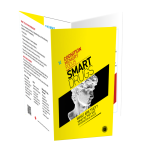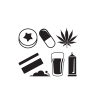Smart drugs, also known as nootropics, are a group of substances that claim to boost your brainpower, focus, and memory. I have added this copy - They’ve become increasingly popular in recent years as people seek ways to improve their cognitive performance.
Whether it’s an essay you want to do really well in, exams you need to revise for, or a looming project deadline, the idea of popping a pill for that much-needed brain boost can seem appealing.
Hundreds of drugs – both manufactured pharmaceuticals and natural organic substances – claim to boost your brain power, and increase intelligence.
This page contains information about the two most commonly used assmart drugs in the UK: the manufactured pharmaceuticals modafinil and Ritalin. It will explain what they are, the risks of using them and how to reduce those risks.
RITALIN & MODAFINIL
Ritalin is a brand-name prescription medication with the active ingredientmethylphenidate, generally used for treating ADHD (attention deficit hyperactivity disorder) and sometimes narcolepsy (falling asleep without warning).
Modafinil, a prescription-only stimulant, is sold under the names Provigil, Modalert, Alertec and Modavigil.
Modafinil is used to treat sleep disorders like narcolepsy.
> How they work
Both drugs are stimulants, which affect the level of certain chemicals in your brain (neurotransmitters).
> Appearance
Ritalin comes in yellow, grey and white tablets and various-coloured capsules. Modafinil comes as a white tablet.
> How they make you feel
The effects are similar to stimulants: they will make you feel more awake, alert, and energised.
The downsides of smart drugs:
- raised blood pressure and increased heart rate
- insomnia
- headaches
- loss of appetite
- dizziness
- skin rash
- in extreme cases, large doses can cause a psychotic episode
> Onset and duration
They take between 30 and 90 minutes to take effect, peak between two to four hours after taking them and can last between 12 to 15 hours or even longer, depending on dose, tolerance to the drug, liver function, and age.
> How long they stay in your system
Both can be detected via a drug or urine test; up to four days later for modafinil and up to three for Ritalin.
> The law
Ritalin (methylphenidate) is a controlled ‘Class B’ substance and is illegal to possess or supply without a prescription. Modafinil is legal to possess but is illegal to supply without a prescription.
THE RISKS
> Irregular sleep patterns
Stimulants can cause insomnia and irregular sleep patterns, increase stress, weaken the immune system, and raise the risk of cardiovascular disease and depression.
> Focus Shift
Some people who use smart drugs find their focus has shifted from the task they set out to do to something else that’s distracted them.
> Pregnancy and contraception
If you use modafinil during pregnancy, it may cause birth defects. It can also reduce the effectiveness of some hormonal contraceptives, including oral contraceptives.
Ritalin may increase the risk of having a miscarriage. Some studies have suggested an increased chance for foetal heart defects when Ritalin is used during pregnancy.
If you’re breast-feeding, avoid using any drug not prescribed by a health professional.
> Addiction and withdrawal
Some people experience withdrawal symptoms such as poor concentration, sleepiness, low energy, depression, anxiety and shortness of breath. They’re usually infrequent and, in most cases, relatively mild.
Addiction to modafinil is unlikely, but it may be possible as it affects neurotransmitters like dopamine.
> Buying medicines online
Buying prescription-only medicines from unauthorised sources can increase the risk of getting poor quality or fake medication, or even not what you thought you were buying, putting yourself at serious risk of harm.
> Driving
Both can cause blurred vision and might affect your reactions and ability to drive. It’s an offence to drive while your reactions are impaired.
HARM REDUCTION TIPS
Modafinil and Ritalin are intended for people who need medication for specific conditions. You increase the risks if you take drugs you don’t medically need. Do your best to avoid using study drugs.
But, if you’re still considering taking them, here are some tips on reducing the potential for harm:
> Know the risks
Research the drugs you want to take. Don’t take what your friends or websites say at face value.
> Know when to stop
If you get any adverse side effects, such as anxiety, insomnia, or headaches, stop taking them.
> Low and slow
Start with a low dose and see how you react. You can always increase the amount later, if needed.
> Avoid mixing with drugs or alcohol
Mixing smart drugs with other drugs or alcohol, makes their effects unpredictable.
Drugs and alcohol can cancel each. You could take more to get the same effects - leading to dangerous levels of both.
Even at low doses, some combinations can increase how long the effects last, make sleep more difficult and increase the risk of high blood pressure, racing heartbeat, panic attacks and serotonin toxicity.
> Take a break
Don’t take them every day. They can have a cumulative effect. Even if you don’t have side effects, taking breaks from them can help to reduce the risk of dependency.
> Don’t mix with antidepressants
Avoid taking MAO inhibitors (anti-depressants). Be cautious: both substances affect chemicals in the brain and, when combined, can cause dangerous interactions.
DO SMART DRUGS WORK?
For people who have no medical need for Ritalin or modafinil, they are risky, and unlikely to make any difference to their cognitive performance.
If there is any benefit, research suggests it’s quite modest and rather than making you smarter, they make you feel more awake and alert, so you get more done.
Most people would be better off focusing on getting enough sleep, following a healthy diet, and managing deadline stress.
BEFORE YOU REACH FOR THE PILLS, CONSIDER THESE STUDY TECHNIQUES:
> Find a good place to study
Make sure the space is free from distractions and that you’ve got everything you need, such as your textbooks, notes, and a computer.
> Set realistic goals
Don’t try to cram everything into one study session. Break what you’re doing down into smaller, more manageable chunks.
> Use active learning techniques
Try to summarise the material in your own words, create concept maps, or practice answering questions.
> Take breaks
Studying for long periods can be counterproductive. Get up and move around every 20-30 minutes to avoid burnout.
> Reward yourself
When you reach a study goal, give yourself a small reward to help with motivation.
> Get enough sleep
Studying when you’re tired is counterproductive. Aim for 7-8 hours of sleep each night.
> Manage your stress
Stress can make it difficult to focus and learn. Find healthy ways to manage stress, such as exercise, yoga, or meditation. Exercise has been linked to enhanced memory, improved focus, and increased cognitive flexibility. Meditation can help improve attention and focus.
WHAT TO DO IN AN EMERGENCY
If you, or someone you know, are experiencing any of the following symptoms, call 999 immediately:
- chest pains
- extreme confusion or severe agitation
- uncontrollable shivering or shaking
- overheating and an inability to control body temperature
- stomach pains and/or continuous vomiting
Stay with the person in an emergency and reassure them until help arrives. Be honest about what they’ve taken, how much, and when.
ADDITIONAL HELP AND SUPPORT
Talk to Frank
National drugs awareness site for young people.
Call 0800 77 66 00 (calls are free and confidential)
talktofrank.com
Mind
Student mental health information.
mind.org.uk/information-support/tips-for-everyday-living/student-life/
Release | Drugs, The Law
Free non-judgmental, specialist advice and information on issues related to drug use and to drug laws.
release.org.uk


















